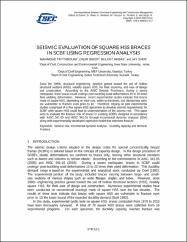Please use this identifier to cite or link to this item:
https://hdl.handle.net/20.500.11779/1087| Title: | Seismic Evaluation of Square Hss Braces in Scbf Using Regression Analysis | Authors: | Shen, Jay Akbaş, Bülent Şeker, Onur Faytarouni, Mahmoud |
Keywords: | Incremental dynamic analysis Fracture Seismic risk Ductility capacity and demand |
Publisher: | ISEC Press | Source: | Faytarouni, M., Seker, O., Akbas, B., & Shen, J. (May 20, 2019). Seismic evaluation of square hss braces in scbf using regression analysis. Interdependence between Structural Engineering and Construction Management. | Abstract: | Since the 1990s, structural engineering practice geared toward the use of hollow structural sections (HSS), notably square HSS, for their economy, and ease of design and construction. According to the AISC Seismic Provisions, during a severe earthquake, these braces could undergo post-buckling axial deformations 10 to 20 times their yielding deformation. However, recent experimental studies indicate that braces made of square HSS, depending on their size, width-to-thickness, and slenderness ratio, are vulnerable to fracture even prior to 10. Therefore, relying on past experimental studies comprised of a few square HSS specimens to develop seismic requirements for SCBF with square HSS could lead to underestimation of the seismic risk. This paper aims to evaluate the fracture risk of braces in existing SCBFs designed in accordance with AISC 341-05 and AISC 341-16 through incremental dynamic analyses (IDA) along with experimentally developed regression model that estimates fracture. | URI: | https://doi.org/10.14455/isec.res.2019.149 https://hdl.handle.net/20.500.11779/1087 |
ISBN: | 9780996043762 |
| Appears in Collections: | İnşaat Mühendisliği Bölümü Koleksiyonu Scopus İndeksli Yayınlar Koleksiyonu / Scopus Indexed Publications Collection |
Files in This Item:
| File | Description | Size | Format | |
|---|---|---|---|---|
| STR-53.pdf | Konferans Dosyası | 523.6 kB | Adobe PDF |  View/Open |
CORE Recommender
Page view(s)
66
checked on Jan 13, 2025
Download(s)
14
checked on Jan 13, 2025
Google ScholarTM
Check
Altmetric
This item is licensed under a Creative Commons License
